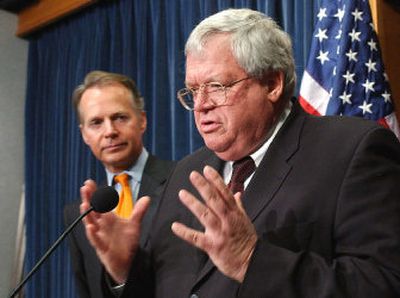GOP unveils lobbying reforms

WASHINGTON – Republicans in the House of Representatives proposed lobbying reforms Tuesday, eager to limit political damage from their party’s ties to disgraced lobbyist Jack Abramoff before they endanger their hold on power in this year’s congressional elections.
If enacted, the new rules could change some of the ways that Washington does business by making it more difficult, but not impossible, for lobbyists and their clients to get privileged access to lawmakers.
Corporate jets and privately financed junkets would be off limits to members of Congress. So would gifts worth more than $20, including expensive dinners and tickets to sporting events in luxury skyboxes. All are favored venues for lobbying.
House Republican leaders also vowed to consider limiting or abolishing “earmarks,” or pork-barrel spending, the special appropriations for favored constituents, groups or interests that lawmakers tuck into laws. The practice has exploded in recent years, attracting ever more lobbyists and feeding the growth of government spending.
New rules, if enacted, could have an impact on this year’s elections and help shape the national agenda for the next two years.
The lobbying scandal hasn’t yet hurt Republicans politically: Polls suggest that the public so far thinks both parties are corrupt. But Republicans want to make sure that Democrats don’t have the field of reform to themselves: Republican leaders rolled out their still-unfinished plan in a hastily called news conference the day before top Democratic lawmakers plan to unveil their ethics plan.
“I have been deeply disturbed by those who have broken the rules of this House and in some instances have pleaded guilty to breaking the law,” said House Speaker Dennis Hastert, R-Ill. “While the problems we have all been reading about stem from violation of existing rules, I believe that to regain the trust of the American people in this institution, we must go further than prosecuting the bad actors.”
Hastert had shown little public interest in reform until Abramoff pleaded guilty to felony charges and former House Majority Leader Tom DeLay, R-Texas, was forced to step down from his leadership post because of his indictment in Texas on charges that he conspired to evade campaign-finance law. DeLay had extensive connections to Abramoff, but hasn’t been charged in any Abramoff-related crime.